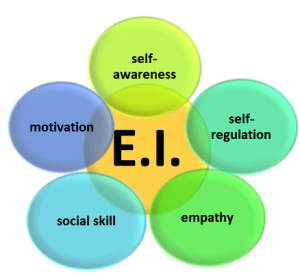Nowadays people contend that it is essential to be able to handle certain difficult situations at work. These situations usually are related to the ability of managing your emotions in a social context.
What does this have to do with teaching English? We think that our job is safe if we have a good level of English, we know how to apply the different teaching methods needed to instruct different kinds of learners and sufficient teaching experience, don’t we? Shouldn’t that be enough?
Thinking about this, a memory of a difficult situation came to my mind.
This is it:
I used to train teachers who gave lessons in a five-day program institute and one of them came to me and related the following case: As part of his duties, he had to give a grade for the homework done in the workbook. He needed two scores per week, so he didn´t need to check students´ workbooks every day. One day, he checked the students´ workbooks and after that there was a break. When he returned to class, a lady (one of his students) was waiting for him outside the classroom. She claimed that he chose the day she didn´t do her homework to ask for it to make sure that she would fail. Unbelievable, wouldn’t you think? Everything that came to his mind was: “What! What in the world is she talking about?” Instead of retorting to the absurdity, which was his first spontaneous reaction, he tried to calm down himself, and tried to understand why she was behaving that way. Eventually, he realized she was extremely worried about the possibility of failing the course, so he serenely explained to her that there was no way he could know beforehand when she had o hadn´t done her homework. He also offered to help if she had trouble doing the assignment if she didn´t understand. The woman quieted down, returned to class and later in the course she asked for help only once. After that, she became the sweetest person one could ever imagine. Even more, she recommended him to all her contacts.
So, what had happened? Why didn´t this episode with the woman become a nightmare?Had the teacher used his emotional intelligence or Emotional Quotient-EQ, as David Goleman calls it? According to him there are five components. Let´s see if the teacher in the example used them.
1. When he calmed down himself and tried to understand his student, he definitely identified his emotion and worked on regulating it. This covered two abilities: self-awareness and self-regulation.
2. Offering his help he showed he was able not only to understand how she was feeling but also to manage his response at the light of this information. This is related to a third component: empathy.
3. Being able to interact well with others is another important aspect of emotional intelligence. This ability is known as social skill and he used it when he could manage the woman´s emotions by listening actively when she was explaining what she thought was happening. He got her to return to classes and, even better, later act as a reference for other students.
4. Even though the example given does not display a specific action that illustrates motivation, it is certain that the teacher mentioned encouraged himself to achieve his goals which were beyond mere external rewards. In fact, he used this experience as a driving force to use his emotional intelligence every time it was necessary and became a teacher whom everybody liked and wanted to work with.
Was he born with these qualities? Can we learn them?
Do we need to learn them?
Many employers find emotional intelligence extremely important since it is the one quality that allows people to productively work with peers in better conditions. Employers consider soft skills as important as hard skills since without them employees find employment challenges insuperable.
For us, teachers, the situations in which we may need to use our emotional intelligence are many. Probably the most common ones are the circumstances in which we interact with our students, our colleagues, our students’ parents or relatives and our supervisors, whether they are coordinators, trainers or directors.
A tip that usually works for me is to think the following: Behave, react and respond in the way that person would if he or she were you. For example, be the teacher that student would need if he were you. In the example given lines above, did he need an interlocutor as a punching back? or one that tried to find out what was happening that made her behave that way? It´s certainly not an easy job, but if we work on this, we will definitely be on the right track. Putting myself in the other person’s shoes works for me. What about you?
And if you do not want to love your neighbor as much as yourself, think about the possibility of losing your job because it is very demanding for others to work with you. If it is extremely difficult to manage your emotions with students, it is very likely that the same happens with the other people with whom you work. We need to educate ourselves or look for help.
We would be “safe” and keep our jobs if we act proactively and update not only our language skills and our methodological foundation but also train to improve our emotional intelligence since this is precisely what technology would never dominate, in the words of laureate professor Vikas Pota, Chairman, of Varkey Foundation, a family organization seeking to improve global teacher capacity and promote universal access to quality education.
What do you think?
Is Emotional Intelligence really important?
Have you ever been in a situation in which you needed to use it?
Have you trained yourself or is it natural in you?
References:
Goleman,D. “Emotional Intelligence (Goleman),” in A Blog by Concordia University, November 17, 2017, https://education.cu-portland.edu/blog/classroom-resources/daniel-golemans-emotional-intelligence-theory-explained/
Pota, V. World Economic Forum. https://www.weforum.org/people/vikas-pota
Estimated reading time: 5 minutes, 3 seconds













Relevant aspects to take into account.
Great! I relate a lot with the article with my job. I am a former ESL instructor. Now in ministry, one of the things we remind when we train leaders in parishes is to be conscious of the feelings of others. Definitely it is key to place ourselves in the neighbor’s shoes is key. Once you have a relationship with someone, you have an “encounter”, you show this participant-the teacher in the example- you really care for his success. No turn around, this participant is confident and trust the teacher will be on her side. Way to go Flor!
Many thaks for your comment.
Indeed. Many thanks for your comment Javier. Keep in touch!
Este comentario ha sido eliminado por el autor.
I love the article. I do think we need to have these abilities in mind when entering the classroom. We do cope with lots of personalities and it is up to us to manage them well. Miss Flor you article reminded me of a paper I read about Emotional Intelligence which is taught and borrowed by school systems in the hopes of making the students at ease so they can do well at school. However, data suggests that there's no correlation between school attainment and emotional intelligence (Mitrofan and Cioricru, 2014). In other words, teaching the student or making them aware of the skills Goleman claimed is not a strong predictor for school attainment (Kashani, Azimi and Sh, 2012). It is true that we as teachers need to develop those skills but we need to be aware of the empirical research out there. I do not know whether or not students need to know about this but teachers should know of this information. I always read your articles Miss Flor and look up to you. Warm regards …
Thank you for your further insights Robert, very interesting. It is essential that we learn about anything that is related to students´ learning. Everyting is useful; however, we also have to make sure that we use our time and energy efficiently. Keep following us! Regards!
Comments are closed.